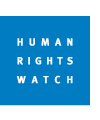Home »
» Human Rights Watch Lessons (Hopefully) Learned by the ICC in Côte d’Ivoire
|
Interview: Lessons (Hopefully) Learned by the ICC in Côte d’Ivoire

Photo © 2014 Human Rights Watch
Fighting rocked Côte d’Ivoire after its 2010 presidential election, when the country’s then president, Laurent Gbagbo, refused to step down in favor of current President Alassane Ouattara. The country descended into five months of violence, with the conflict waged along political and sometimes ethnic and religious lines. At least 3,000 people were killed and 150 women raped, with abuses committed by both pro-Gbagbo and pro-Ouattara forces.
In October 2011, the International Criminal Court (ICC) prosecutor opened investigations into the violence. Although the ICC prosecution committed from the outset to investigate both sides – and says it still plans to – it has so far only opened cases for crimes allegedly committed by forces allied to Gbagbo, including Gbagbo himself. This move has led to dangerous perceptions of a biased court, left many victims of the fighting without a sense of justice, and made it difficult for ICC staff to disseminate information. Elizabeth Evenson, senior international justice counsel at Human Rights Watch, speaks with Elly Stolnitz about the new report, “Making Justice Count,” what the ICC needs to do – not just in Côte d’Ivoire but also in other countries – and how it can better deliver justice in The Hague that matters to victims on the ground. share on:   |
|
Dispatch: India – Shoot First, Ask Questions Later
By Meenakshi Ganguly
On the evening of Sunday, July 26, Dhubeswar Nayak and his wife Budi walked up a hill from their village of Pangalpadar in the eastern Indian state of Odisha to make a phone call. They wanted to speak to their sons, who work as laborers in Kerala state, and the mobile phone signal is stronger up on the hillside. It was the last conversation either of them would have.
See the Latest News in Asia »
| share on:   |
|
|
|
| VIDEO |  | |  | | |
| VIDEO |  | |  | | China should end its Olympian abuses.
View Now » |
| IN REMBERANCE |  | Remembering Jemera Rone, a pioneering human rights researcher. View now >>
|
|
|















